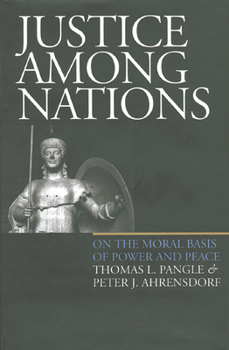Justice Among Nations: On the Moral Basis of Power and Peace
Select Format
Select Condition 
Book Overview
In the post-Cold War era, we have lost the clarity that once characterized our vision of international conflict. Foreign affairs are no longer defined solely by the ideological battles fought between capitalism and communism or by the competition between two great nuclear superpowers. That oversimplified view has been replaced by an increasing awareness of the moral and political complexity surrounding international relations. To help us deal with this new reality, Thomas Pangle and Peter Ahrensdorf provide a critical introduction to the most important conceptions of international justice, spanning 2,500 years of intellectual history from Thucydides and Plato to Morgenthau and Waltz. Their study shows how older traditions of political philosophy remain relevant to current debates in international relations, and how political thinkers through the centuries can help us deepen our understanding of today's stalemate between realism and idealism. Pangle and Ahrensdorf guide the reader through a sequence of theoretical frameworks for understanding the moral basis of international relations: the cosmopolitan vision of the classical philosophers, the "just war" teachings of medieval theologians, the revolutionary realism of Machiavelli, the Enlightenment idealism of Kant, and the neo-realism of twentieth-century theorists. They clarify the core of each philosopher's conceptions of international relations, examine the appeal of each position, and bring these alternatives into mutually illuminating juxtaposition. The authors clearly show that appreciating the fundamental questions pursued by these philosophers can help us avoid dogmatism, abstraction, or oversimplification when considering the moral character of international relations. Justice Among Nations restores the study of the great works of political theory to its natural place within the discipline of international relations as it retrieves the question of international justice as a major theme of political philosophy. It provides our moral compass with new points of orientation and invites serious readers to grapple with some of the most perplexing issues of our time.
Format:Paperback
Language:English
ISBN:0700612211
ISBN13:9780700612215
Release Date:June 1999
Publisher:University Press of Kansas
Length:372 Pages
Weight:1.24 lbs.
Dimensions:0.8" x 6.0" x 9.4"
Customer Reviews
1 rating
Lessons from political philosophy for international relations
Published by Thriftbooks.com User , 17 years ago
This is another fascinating book from Thomas Pangle, this time in collaboration w/ Peter Ahrensdorf. They provide us with a compelling tour through the history of political philosophy by looking at how political philosophers spoke to or about international relations (IR). Their focus on IR takes them to the usual stops on a Straussian tour of political philosophy (Thucydides, Plato, Aristotle, Cicero, Augustine, Aquinas, Machiavell, Hobbes, Spinoza, Kant, Hegel, etc.). It also lets them focus on the thought of lesser known thinkers such as Vitoria, Dante, Grotius and Thomas More. They finish their history with searching examinations of Hans Morgenthau and Kenneth Waltz. This analytical history is very enlightening and very useful whether your background is in philosophy or IR. I am not really competent to critique the way they interpret many of the philosophers they examine but I was very comfortable with their presentation of the philosophers I am more familiar with, e.g., Thucydides, Plato, Hobbes, and Kant. I will also say that their essay on Mongenthau made me put him on my reading list. I think the best way to summarize their history is to simply state that the recast the old Straussian dialectic of reason and revelation in terms of IR's realism vs. idealism. Consider one of their leading (at worst) or Socratic (at best) questions from their concluding chapter: "Does the liberal, capitalist achievement of a secure and physically comfortable existence constitute a goal worthy of our human being, or does it not ultimately sap our moral spirit and render apathetic or heartless our civic association?" (p.262) Pangle and Ahrensdorf take this question very seriously and make very interesting points about it. Not the least is their willingness to see that the Christian tradition of just war theory had (at the least) a tendency "toward aggressive moralism" (p.112 but see the whole of chapter 4). They also apply the (very well developed among Straussians- e.g., see Rahe or Zuckert) classical insight that politics seems to flourish among smaller communities or nations. The size has to be such that the citizens can really share in a sense of the "loved things held in common". How does that aspect of political humanity work into the IR need for a cosmopolitan universalism? Heck, look at our country and think of the same issue in terms of how we can make federalism actually work. If it is hard for us in our single, well-educated and liberal (well, prior to Bush) country, then think of the challenge on the international level. Pangle in particular is up to the challenge of all these issues. In their final chapter, Pangle and Ahrensdorf talk of the possibility of reviving the Christian tradition of political philosophy. They see the universalism of the God of the Bible as providing a possible way to theorize and then actualize a IR that manages to avoid both the totalitarian possibilities of a world government and the anarchial possibilities of a world whe





